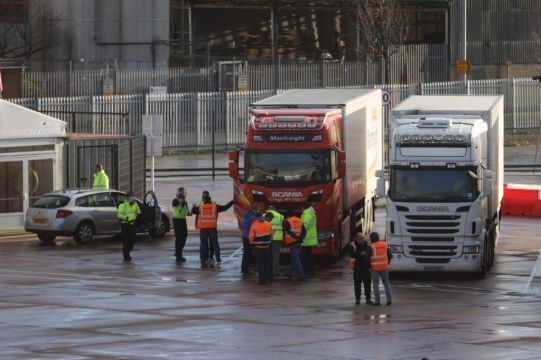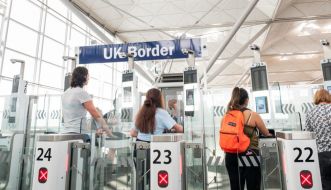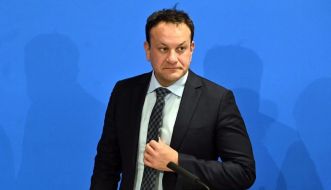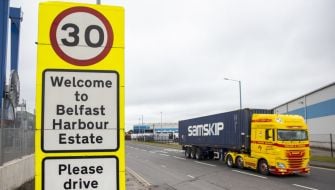The first checks have taken place on goods arriving in Northern Ireland from Great Britain following the end of the Brexit transition period.
There was little sign of disruption at the border as freight travelled across the Irish Sea on a quiet bank holiday after the new arrangements came in at 11pm on New Year’s Eve.
But, according to Logistics UK, close to half the lorries entering Belfast on the first ferry of the day from Britain on Friday were called in for inspection as part of new Brexit rules, with one truck stopped in the port for at least three hours as “teething problems” arose.
British prime minister Boris Johnson said that leaving the single market and customs union meant the UK has “taken back control of our money, our laws and our waters”.
Lower trade volumes on the New Year’s Day bank holiday meant there was little disruption from the additional red tape that now applies on British exports to the EU.
The Eurotunnel and the Port of Dover both told the PA news agency that services were running smoothly.
Four truck drivers were turned away by Eurotunnel but all as a result of failing to produce coronavirus test certificates, rather than falling foul of new customs rules.
Calais also reported calm but the region’s customs director Jean Marc Thillier warned the arrangements would face a “trial by fire” when traffic flows increase after the holiday weekend.
Circulation fluide sur le #PortCalais. Traffic is free flow into #PortOfCalais pic.twitter.com/3TBf0evV5t
— Port de Calais (@calaisport) January 1, 2021
Advertisement
Mr Johnson, writing in the Daily Telegraph, said the “great new deal” with the EU secured on Christmas Eve honours the “most basic promises” of the 2016 referendum and meant the UK has “taken back control of our money, our laws and our waters”.
The EU had provided the UK with a “safe European home” during the 1970s, but the country has now “changed out of all recognition” with global perspectives, he said.
In a sign that the UK will break away from the EU rules it inherited, Mr Johnson said: “We need the Brexit-given chance to turbocharge those sectors in which we excel, to do things differently and to do them better.”
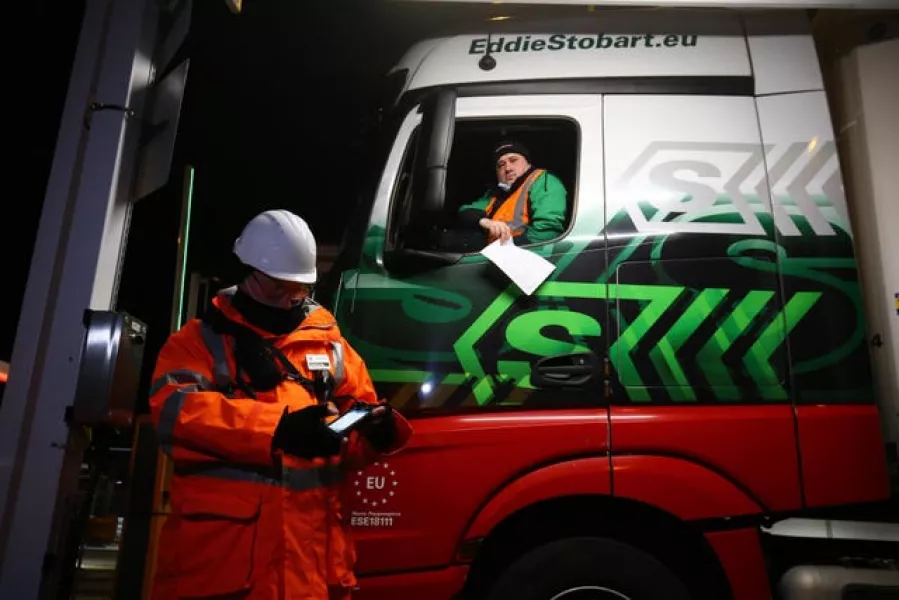
Minister for Foreign Affairs Simon Coveney said the change in trading arrangements with the UK will inevitably cause disruption.
He told BBC Radio 4’s Today programme: “We’re now going to see the €80 billion worth of trade across the Irish Sea between Britain and Ireland disrupted by an awful lot more checks and declarations, and bureaucracy and paperwork, and cost and delay.”
Ferry operator Stena Line said six freight loads destined for Ireland had been turned away at Holyhead due to incorrect paperwork.
While it has been quiet in Holyhead so far today, the port authority indicate that six freight loads bound for Ireland have had to be turned away due to not have the correct references. Hauliers please ensure you have your PBNs ready for check-in. @WGEconTransport @TrafficWalesN https://t.co/ae7KmPwPxb
— Stena Line (@StenaLine) January 1, 2021
Seamus Leheny, policy manager at Logistics UK, told BBC Radio 4’s PM there had been a new inspection regime to get used to for the first arrivals into Belfast on Friday afternoon.
He said: “There were only 15 lorries on that particular boat. However, six of the lorries were selected to go for inspection at the border control post at Belfast harbour.
“I know that at least one of those lorries is still detained three hours later, so already we’re seeing some consequences of this.
“Inevitably there are going to be teething problems because with such a new, complex system as this, there are going to be issues in the first few days.”

Former British minister David Jones, deputy chairman of the European Research Group (ERG) of Brexiteer Tories, said “a border in the Irish Sea was something that we did not expect, nor did we approve of”.
He told the BBC that while “it does amount to a barrier”, the UK government had “done a great deal to mitigate the problem, but I think it is going to take some time before the new arrangements bed in”.
The Northern Ireland Protocol means the North remains in the EU single market for goods and will apply EU customs rules at its ports, even though the region is still part of the UK customs territory.
The protocol will also see Northern Ireland follow certain EU rules on state aid and VAT.
In other developments:
– Nicola Sturgeon said the EU should be ready to welcome an independent Scotland back into the bloc. The First Minister said: “Scotland will be back soon, Europe. Keep the light on.”
Scotland will be back soon, Europe. Keep the light on 🏴❤️🇪🇺❤️🏴 pic.twitter.com/qJMImoz3y0
— Nicola Sturgeon (@NicolaSturgeon) December 31, 2020
– French president Emmanuel Macron used his new year’s message to say that while the UK remains a “friend and ally”, Brexit was born of a European malaise and “many lies and false promises”.
Under the new arrangements, freedom of movement rights end for UK citizens and, while they can still travel for work or pleasure, there are different rules.
Passports must be valid for more than six months, visas or permits may be needed for long stays while pets need a health certificate.
The automatic right to live and work in the EU also ceases, and students in Great Britain will no longer take part in the Erasmus student exchange programme.
